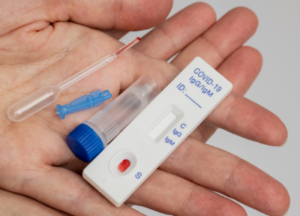
The Departments of Labor, Health and Human Services (HHS), and the Treasury (collectively, the Departments) issued Frequently Asked Questions (FAQs) Monday that generally require group health plans and insurers to cover the costs of at-home over-the-counter COVID-19 tests (OTC COVID-19 Tests) approved by the U.S. Food and Drug Administration (FDA) and purchased on or after January 15, 2022. Plans and insurers may, but are not required to, cover the cost for OTC COVID-19 Tests bought before January 15 (though some states have existing rules requiring these tests to be covered by carriers). The FAQs expand prior guidance that has only required plans and carriers to cover the costs of testing administered by a health care provider.
Generally, the FAQs provide that covered individuals can go online or visit a pharmacy or store and buy approved OTC COVID-19 Tests. Each person covered under a plan may get up to eight OTC COVID-19 Tests per month, so a family of four could get up to 32 tests each month. There currently is no limit on at-home tests ordered or administered by a healthcare provider.
Plans and carriers have the option of covering the tests free of charge at the point of sale, or they can reimburse the costs of the tests upon an individual showing proof of purchase. A safe harbor will allow plans and insurers to provide free testing through existing pharmacy or direct delivery networks provided they take reasonable steps to ensure that participants, beneficiaries, and enrollees have access to OTC COVID-19 Tests through an adequate number of retail locations (including both in-person and online locations). Further, the FAQ state that plans and issuers should ensure that participants, beneficiaries and enrollees know key information needed to access OTC COVID-19 Tests, such as the dates when the direct coverage program is available, and a list of participating retailers or other locations.
If a plan or carrier has set up a network to take advantage of the FAQ safe harbor, individuals still can go out of network, but plans and insurers would only be required to reimburse at a rate of up to $12 per test (or the cost of the test if under $12). The FAQs caution, however, that a plan or insurer that relies on the safe harbor, but is unable to meet the requirements (for example, due to significantly longer delays regarding availability of OTC COVID-19 Tests than apply to other items under the plan’s or issuer’s direct-to-consumer shipping program), cannot deny coverage or impose cost sharing (including setting limits on the amount of reimbursement) with respect to any OTC COVID-19 Tests obtained by participants, beneficiaries or enrollees, including tests purchased from non-preferred sellers. Finally, if a plan or issuer has not set up a network to provide free point-of-sale OTC COVID-19 Tests, it must reimburse the full cost of the tests.
Employers should note that the OTC COVID-19 testing mandate does not apply to tests required for employment purposes. Thus, where an employer requires employees to test multiple times per week and submit results as a condition of employment, insurers are not required to cover the costs under the new rules. Consumers will welcome the recent announcement regarding at-home testing costs, but questions remain as to how the program will function. We will continue to monitor developments and provide updates as we learn more details.
This information has been prepared for UBA by Fisher & Phillips LLP. It is general and is provided for educational purposes only. It is not intended to provide legal advice. You should not act on this information without consulting legal counsel or other knowledgeable advisors.




